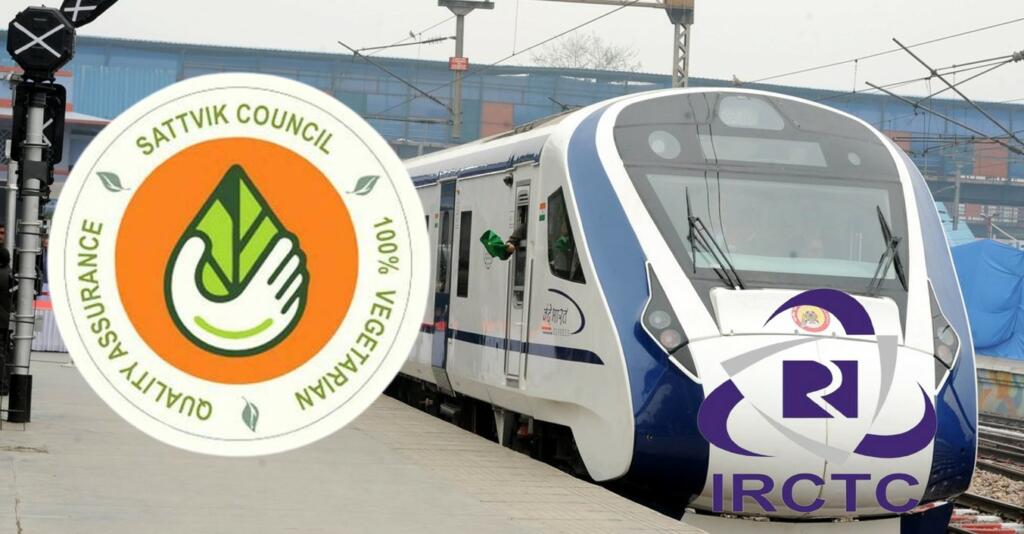In one of the most laudable moves to promote vegetarianism and Hindu pilgrimages in the country, IRCTC and the Sattvik council of India (SCI) have decided to collaborate to cut down non-veg elements to zero in Indian Railways’ foods.
IRCTC and SCI will jointly issue sattvik certificates:
The Indian Railway Catering and Tourism Corporation (IRCTC) has decided to promote vegetarian-friendly food on Hindus’ religious route. For this, IRCTC will issue a ‘Sattvik certificate’ to trains running on certain specified routes. The certificate will be issued in collaboration with the Sattvik Council of India. In a press release, the SCI said, “IRCTC base kitchens, executive lounges, budget hotels, food plazas, travel and tour packages, Rail Neer plants will be ‘sattvik’ certified to ensure vegetarian friendly travel,”
Strict guidelines will be followed:
According to the proposed guidelines; every person on the trains en route to Hindu religious places like Varanasi, Katra, Ujjain, and others will only be served vegetarian food. The arrangement of only veg food will not just be a formality, but the whole procedure will be followed in spirit.
According to a report by the Indian Express, cleaning agents, soaps, and detergents used to wash the kitchen utensils will be neutral; that is no such product will be used whose manufacturing process involves non-veg elements. Moreover, the cooks who will be preparing the food will be required to only consume vegetarian food. Similarly, an overhaul of currently available Kitchens will take place to make sure that these Kitchens never handle anything other than vegetarian items.
After purifying the cooking elements involved, the servers will also be hired based on their food preference. If they have to serve to religious pilgrims, they will be required to not touch anything other than vegetarian food.
Future of the certification scheme:
The first train to get the Sattvik certificate will be the ‘Vande Bharat train’ which runs from Delhi to Katra. IRCTC is also planning to certify not just the Kitchen but also the base kitchen from where food in the future will be sourced, the two lounges in Delhi and Katra, and one floor of Ginger hotel. The model is planned to be replicated in at least 18 more trains including Vande Bharat, which runs from Delhi to Varanasi.
Viturv Pathak of Sattvic said, “We are looking at future digital options that PNR generated for vegetarian passengers in Sattvic-certified train is such that passengers cannot even order food from outside through e-catering, as they will only get vegetarian options to order from, Vegetarians/vegans increasingly represent an influential consumer segment in tourism… Vegetarian food and environment are what they look for…”
First such scheme for Hindus:
This is the first time when a special food certificate scheme has been launched for Hindus. Up until now, this privilege was only accorded to the Muslims. Special halal-certified restaurants run to serve their preferred choice of meat to the Muslims. People and businesses not catering to these demands are constantly harassed by goons as well as other authorities.
Read more: Hindu activist in Communist-ruled Kerala gets jailed for calling for the boycott of Halal products
As reported by TFI, recently there has been a much-needed uproar about halal certification by the Hindus of the country which has forced restaurant owners to even cater to Hindus’ non-veg preference of Jhatka meat.
Read more: Modi government liberates the red-meat industry from Halal monopoly
The scheme will change the tourism scenario around the pilgrimage:
The special certification scheme has the potential to change the fortunes of Hindu pilgrimages in the country. Currently, there are millions of Hindus in India, who want to visit the religious sites carefully constructed and protected by their forefathers.
Read more: UP is emerging as the biggest religious tourism hub under CM Yogi
However, most of them believe in being free from Tamsic elements, which according to them is a hindrance in their path to worshipping Bhagwan. Since travelling involved consuming food coming from non-vegetarian hands, they preferred to choose their pooja in the nearest vicinity. This scheme will open the floodgates for them and inspire other non-vegetarians to approach a sattvik lifestyle.
